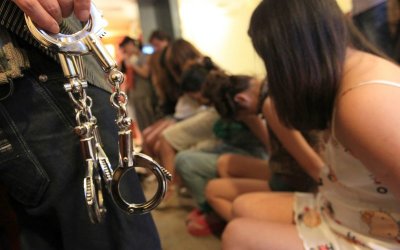3 things to help fight sex slavery

I didn’t recognize the email address, but in a few paragraphs, I remembered our connection. She’d been a friend of a student I’d helped years ago. Even though I recalled her face, it was her words that shattered my shallow world.
At 15, Lisa had run away from home. She had to. Her mom had been into drugs, and she was pretty much on her own anyway. Lisa hated going home and avoided it as much as she could. So, when her mom got verbally abusive, she left everything behind — her few belongings, school, and friends.
Lisa’s face never made it to a missing child poster because her mom never bothered to report her missing. For Lisa, life’s realities hit quickly without a place to go and food to eat. She hitchhiked to nearby Seattle thinking life would get easier. Little did she know she’d walked into a prison that she wouldn’t escape for years.
A young man picked her up off the street, offered dinner and let her sleep in a room in an apartment outside the city. With nowhere else to go, Lisa gladly accepted. Soon her nightmare began. The details Lisa shared were hard to read, and she should never have been forced to live out. She’d become a sex slave.
On a couple occasions she tried to run away. But she was soon caught and so badly beaten that she couldn’t “work” for a week. Her only income came from the abusive men who came at all hours. She wasn’t allowed to keep any money, nor would anyone help her escape. Lisa’s innocence had been lost, and what was left of her hope was diminishing.
Something triggered within her that she needed to try to escape once more. This time her carefully made plans worked and she safely made it to freedom.
Which brings me back to Lisa’s email. How could the illicit, lucrative market of selling children happen here? I knew where this email was heading. Tough problems always seem to come down to money. But it wasn’t about Lisa wanting money.
She knew the only way to win this slavery war was to let people know it was happening in their backyard. Awareness is an interesting phenomenon — once you’re aware of a problem, you can no longer say you never knew. Between 100,000 to 500,000 American children are bought and sold for sex in the United States each year. Drugged, raped, beaten, and kept in a “prison with chains we can't see” as one policeman has said.
Lisa’s mission is to save children from the chains of bondage we cannot see. The unspeakable injustice in her life is being used to help those like her and those who might be its next victim. For this amazing young woman, it’s all about awareness. She visits schools and talks to community groups. Slavery now has a local, small-town face and it's one we won’t forget.
January has been designated as National Slavery and Human Trafficking Prevention Month. Chances are there are those in your community that are vulnerable to being trafficked — teenage runaways, those who are trapped in drug abuse, or those living in poverty and are desperate.
Here are three things you can do:
1. Support events that raise Human Trafficking awareness — especially in our local schools.
2. See something suspicious? Write down car license plates and descriptions of the people involved.
3. If you suspect someone is a victim of human trafficking, contact the National Human Tracking Hotline at 1-888-373-7888. If it’s appropriate call 911.
We need to be the voice for those who can’t speak for themselves.
Karen Farris saw the need to help underserved kids while serving in a youth ministry that gave her the opportunity to visit rural schools on the Olympic Peninsula. She now volunteers her time grant writing to bring resources to kids in need. She also shares stories of faith in action for those needing a dose of hope on her weekly blog, Friday Tidings.www.fridaytidings.com




























